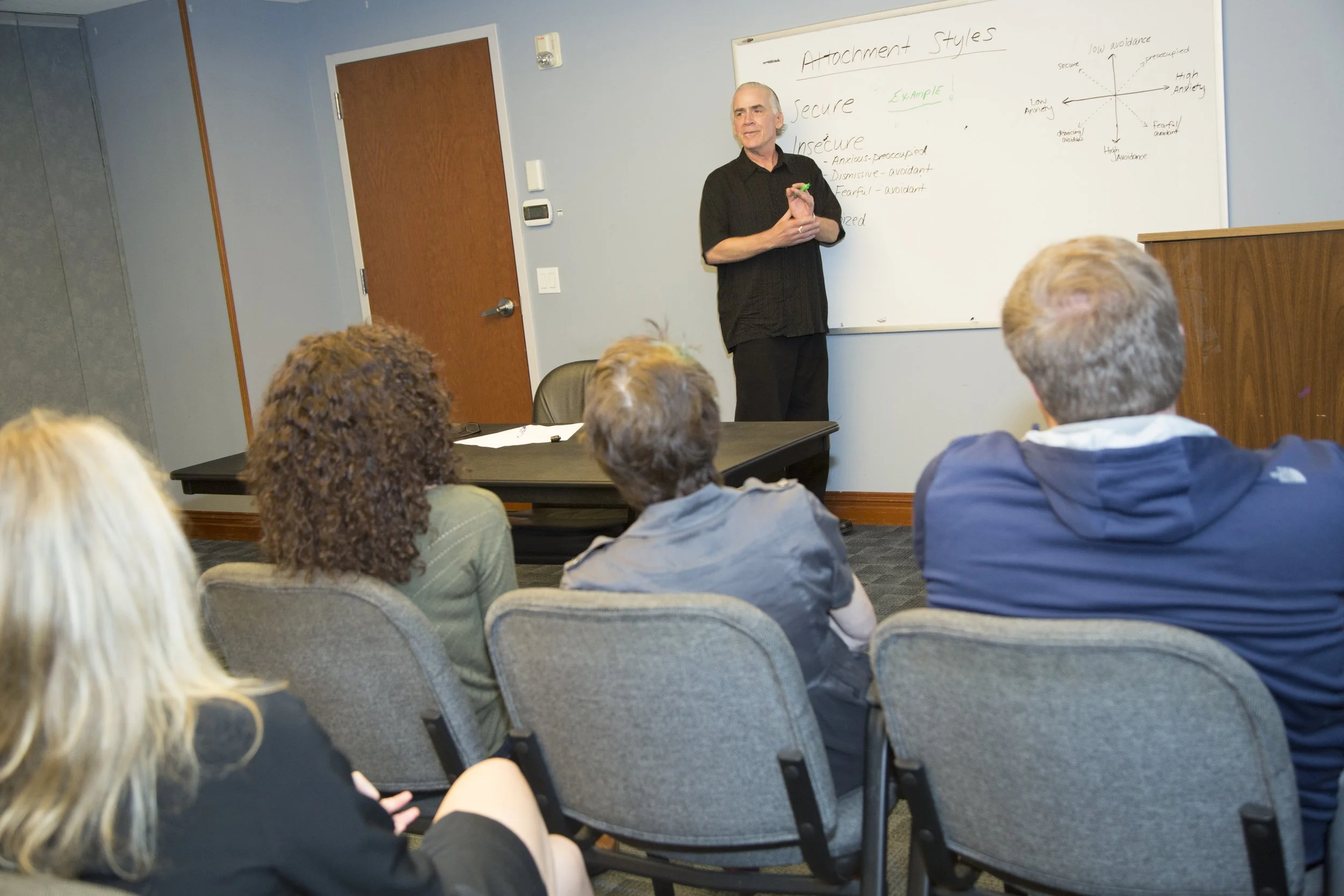Introduction to Relational Psychotherapy Integration
With Lainie Goldwert, PhD
September 15 - 29, 1pm-3pm
This course is grounded in the evidence-supported belief that the intentional integration of multiple therapeutic modalities enhances a practitioner’s clinical flexibility, creativity, and resourcefulness—allowing for more responsive, tailored, and effective work with diverse clients.
This introductory course is part of the PIP certificate program but is open to anyone interested in the art of psychotherapy integration. Covering psychotherapy integration from a relational psychodynamic perspective, we review relevant history, basic concepts, and diverse approaches like common factors and assimilative integration. Ideas are discussed in relation to therapeutic action and the ways people change in therapy, helping students develop a coherent, disciplined integrative practice. Note that the course does not teach specific modalities (which can be learned through other PIP courses during the year), but we will discuss clinical examples along with works by leading psychoanalytic integrationists such as Bresler, Frank, Gold, Safran, Bucci, and Wachtel.
The course is taught on Mondays from 1:00 to 2:50, September 15, 22, and 29, 2025.
Introduction to Current Trends in Couple Therapy: Integrative Relational Perspective
With Michal Seligman, PsyD
September 30 - October 28, 10:30am-12:00pm
Couple therapy as a field has developed to include multiple models of therapy. In spite of significant differences, the integration of some models of couple therapies and techniques has been practiced over the years with great success. This course will review the history of couple therapy, introduce the psychoanalytic couple therapy model, and focus on four of the current influential couple therapists and theorists; John Gottman, Dan Wile, Sue Johnson, and Esther Perel. We will explore models of aggression and conflict in couples as well as love and sexuality. Lastly, a purely behavioral, non-psychoanalytic, approach to the issue of problematic substance use in couples will be presented as a contrast. Couple therapy, to quote Sue Johnson, is “for people from all walks of life and all cultures; everyone on this planet has the same basic need for connection”. The models and principles that will be presented apply to couples independent of their gender identifications, sexual orientations, race, culture, and even individual diagnoses.
Accelerated Experiential Dynamic Psychotherapy
With Michael Mondoro, LCSW
October 6 - December 1, 1:00pm - 3:00pm
This 8-week course introduces clinicians to the core theory and practice of Accelerated Experiential Dynamic Psychotherapy (AEDP), a healing-oriented model grounded in attachment theory, emotion theory, somatic therapies, and interpersonal neuroscience. AEDP aims not only to alleviate suffering, but to activate transformational processes and support flourishing. Participants will learn to apply key interventions — such as undoing aloneness, dyadic regulation, experiential focusing, Transformance detection, and the metaprocessing of transformational affect — within a relational frame. The course emphasizes moment-to-moment somatic tracking, relational parts work, and the co-creation of reparative emotional experiences. Learning modalities include readings, didactic material, clinical video, and experiential exercises, with opportunities to consider how best to adapt and integrate AEDP interventions into your existing practice.
Effective Assessment and Treatment of Suicidal Risk
With David A. Jobes, PhD
November 15 · 10:00am - 1:00pm
The history of clinical suicidology has been dominated by an ineffective, parternalistic, and carceral approaches to controlling patients who are suicidal. Modal interventions for suicidal risk are largely fear based and too often entirely miss the how and why patients become suicidal with clear implications for effective clinical care. This presentation will provide a broad overview of contemporary clinical suicidology with a particular consideration of the Collaborative Assessment and Management of Suicidality (CAMS) which is a patient-centered, evidence-based, clinical treatment for patients who are suicidal. Various psychodynamic considerations will be highlighted throughout this presentation.
From Reparation to Relational Repair: Recognition, Regulation, and Embodied Subjectivity
With Jessica Benjamin, PhD
December 13 · 10:00am - 1:00pm
A crucial phenomenon recognized by Melanie Klein was the deep and pervasive fear of harming the love object and the need to make reparation as an internal process of restoring the sense of goodness, or love, in self, other and world. Of course, Klein attributed this fear to the innate aggression and furthermore did not, as Fairbairn pointed out, distinguish between protecting the internal object and actually making the self good again. founded in the death instinct. Hence the critique of the idea of reparation that has for some time been "all the rage" in the world of critical theory (literature) and has now been adopted by some psychoanalysts. Once we adopt an intersubjective viewpoint, however, and look through the lens of affect regulation, the meaning of aggression and of restoring the self to a sense of goodness appears to us quite differently, and so does the meaning of repair. Understanding how affect dysregulation is recognized and soothed in early development, and following Winnicott’s theoretical line of surviving destruction and Tronick’s observations of rupture and repair, we reinterpret what Klein saw. We grasp how embodied intersubjectivity means self and other are always mutually affecting one another. We come to appreciate the all-important role played by the analyst’s surrender and acknowledgment in regulating the affective “too-muchness” and interactive ruptures of enactments. I have conceptualized this process as moving out of doer and done to into the moral Third; the shared position of witnessing, affirming, and understanding the inevitable experiences of badness, shame, fear of harming and being hurt.
How Affect Organizes the Mind: Implications for Clinicians
With Daniel Hill, PhD
Rescheduled - January 10, 10:00am - 1:00pm
Psychoanalysis is undergoing a quiet revolution. Increasingly, affect is being recognized as the central organizing force of mental life. In this timely and compelling lecture, distinguished author, scholar, and clinician Dr. Dan Hill draws from his forthcoming sequel to the acclaimed Affect Regulation Theory to deepen our understanding of how affect shapes the mind—and how we engage it in clinical practice. Building on the work of Damasio, Fonagy, Schore, and others, as well as his own influential contributions, Dr. Hill will examine the nature and regulation of affect, present a neuroscience-informed model of implicit and explicit mental processes, and show how these systems generate starkly different subjective realities. For clinicians, this lecture offers essential insight into the affective foundations of psychic life—and a powerful lens through which to view psychoanalysis as a dynamic, evolving discipline responsive to contemporary science and clinical need.
Preserving the Language of Subjective Experience
With Nancy McWilliams, PhD
February 7, 10:00am - 1:00pm
Recent decades have seen a subtle but consequential change in how human beings in most Western cultures talk about subjective experience. In response to many converging influences – the popularity of the DSM, pressures from pharmaceutical companies, the demands of a certain kind of academic research, the general speeding up of life in the age of the internet and artificial intelligence – we are losing a way of giving voice to our internal lives. Many scholars have noted elements of this process, which include the psychiatric pathologization of normal states such as sadness and anxiety, dissociative tendencies to treat elements of the self or the body as “other,” the proliferation of personal identities, and the popularity of acronyms that oversimplify complex experience. This talk will explore this trend and its implications for psychotherapy and for the mental health community.
Clinical Implications of Recent
Developments in Neuropsychoanalysis
With Mark Solms, PhD
April 18, 10:00am - 1:00pm
This lecture will be divided into two parts. In the first part, I will revise and update some basic psychoanalytic concepts in light of modern neuroscientific findings. I will focus particularly on our understanding and classification of the drives, the role of feeling in consciousness, the nature of the unconscious, and the mechanisms of repression and defence. In the second part of the lecture, I will consider the clinical and practical implications of these theoretical developments. In particular, I will describe the implications for our understanding of the goals and therapeutic action of psychoanalytic therapy, for our understanding of transference interpretation, and for the importance of working through.
Totalitarianism and Psychoanalysis:
Forces of Liberation and Repression
With Sue Grand, PhD
May 16, 10:00am - 1:00pm
In a time of escalating authoritarianism, we are reckoning, anew, with a recurrent conundrum: how can psychoanalysts meet repressive political forces? Historically, we have met this crisis in European fascism, in the state terror of South America, and in the racism of the United States. These encounters have produced a rich literature on authoritarianism, from which we can benefit in these times. But these epochs have also produced a psychoanalysis of repression. At times, institutes have complied with these regimes, re-writing training as surveillance, rewriting therapy as predation. In this lecture, I will be engaging with the wisdom, and courage, of our forebears. I will also examine our fear and impotence, the urge to survive, our ethical challenges, and the tilt towards compliance. Through multiple theories, and different historical contexts, we will try to find those theories and positions that will help us survive this time. Clinical vignettes will allow us to think, together, about how these times are shaping the dyad.
The National Institute for the Psychotherapies is approved by the American Psychological Association to offer continuing education credits for psychologists. The National Institute for the Psychotherapies maintains responsibility for this program and its content.
The National Institute for the Psychotherapies is recognized by the New York State Education Department's State Board for Social Work as an approved provider of continuing education for licensed social workers #SW-0018.
The National Institute for the Psychotherapies is recognized by the New York State Education Department's State Board for Mental Health Practitioners as an approved provider of continuing education for licensed psychoanalysts #Psyan-0004.
The National Institute for the Psychotherapies is recognized by the New York State Education Department's State Board for Mental Health Practitioners as an approved provider of continuing education for licensed psychologists #PSY-0131.
National Institute for the Psychotherapies (NIP) is recognized by the New York State Education Department's State Board for Mental Health Practitioners as an approved provider of continuing education for licensed mental health counselors. #MHC-0059.
*Please note: not all events that provide CEs are eligible for LMHCs.
Please read the details for each event's CE eligibility
Event Complaint Policy
Each of our continuing education events has either a Director of Continuing Education program, or a NIPTI faculty representative present who is available to hear and resolve any complaints during and/or after the workshop. The faculty representative will attempt to resolve any complaints concerning the presenter directly with the presenter. If this does not meet the satisfaction of the participant, the participant is advised to put his/her grievance in writing and pass it on to the Director of Continuing Education, who will then discuss the grievance directly with the presenter. The confidentiality of the aggrieved individual will be assured. The Director of Continuing Education will mediate the situation and will be the final arbiter. If the participant requests action, the Director of Education will offer one of three alternatives: attempt to offer the participant another workshop, provide a credit for a subsequent year’s workshop or provide a partial or full refund of the workshop fee. The first two options will require a written note documenting the grievance for record keeping purposes. The note need not be signed by the grieved individual. If the grievance concerns NIPTI’s Continuing Education program in a specific regard, the Continuing Education Director will attempt to arbitrate. To submit any complains, please email events@nipinst.org.

